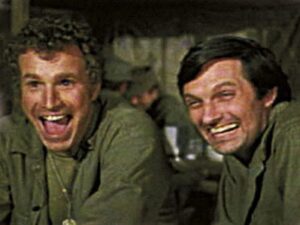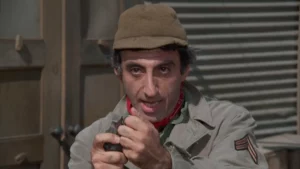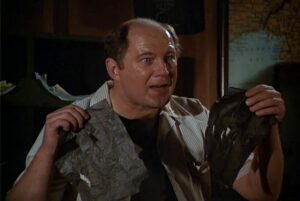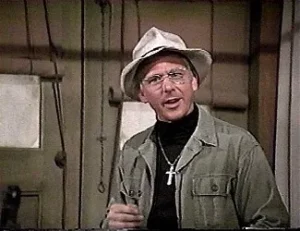MASH wasn’t just a show about war—it was a masterclass in comedic timing, witty banter, and unforgettable character dynamics that kept audiences laughing through eleven seasons. Behind the operating room drama and poignant moments lay some of the most brilliantly crafted comedy in television history. The genius of MASH was in how it balanced the darkness of the Korean War with light-hearted humor that felt authentic and necessary for survival.
The Legendary Hawkeye and Trapper John Partnership
The early seasons gave us the dynamic duo of Hawkeye Pierce and Trapper John McIntyre, whose pranks on Frank Burns became the stuff of television legend. Their elaborate schemes ranged from convincing Frank he was going crazy to orchestrating fake medical emergencies that left the pompous surgeon scrambling. One particularly memorable moment involved them switching Frank’s personal belongings piece by piece until he questioned his own sanity. The chemistry between Alan Alda and Wayne Rogers created comedy gold that set the tone for the entire series.

Hot Lips and Frank’s Secret Romance Gone Wrong
Margaret “Hot Lips” Houlihan and Frank Burns’ affair provided endless comedic fodder, especially when their attempts at discretion failed spectacularly. The episode where the entire camp listened to their intimate conversation over the PA system remains one of the most cringe-worthy yet hilarious moments in television history. Their stolen glances, awkward encounters, and Frank’s desperate attempts to appear professional while sneaking around created a comedy of errors that never got old.
Klinger’s Outrageous Section 8 Attempts
Corporal Max Klinger’s mission to get discharged through wearing dresses became an iconic running gag that evolved into something much deeper. His fashion choices ranged from elegant evening gowns to Carmen Miranda-inspired fruit hats, each more outrageous than the last. The beauty of Klinger’s character was that his attempts were so creative and committed that they became endearing rather than offensive. His interactions with Colonel Potter, who treated each new outfit with deadpan acceptance, created perfect comedic contrast.

Colonel Potter’s No-Nonsense Wisdom
When Harry Morgan joined as Colonel Sherman Potter, he brought a different flavor of humor—the exasperated commanding officer dealing with a camp full of lunatics. His horse Sophie became a running joke, as did his colorful expressions and old cavalry stories. Potter’s reactions to the chaos around him, delivered with perfect timing and a Missouri twang, provided some of the show’s most understated yet effective comedy.
Radar O’Reilly’s Innocent Charm
The company clerk’s ability to finish Colonel Blake’s sentences and anticipate needs before they were spoken created countless humorous moments. Radar’s innocence and naivety, contrasted with his supernatural administrative abilities, made him the perfect straight man for the camp’s antics. His relationships with his teddy bear, his grape Nehi obsession, and his letters home to his mother in Iowa provided gentle, heartwarming comedy that balanced the show’s sharper wit.
Charles Winchester’s Aristocratic Snobbery
When David Ogden Stiers joined as Major Charles Emerson Winchester III, the show gained a more sophisticated foil for Hawkeye and BJ. Winchester’s Boston Brahmin pretensions clashed beautifully with the 4077th’s casual atmosphere. His horror at the camp’s living conditions, his French cuisine attempts with Army rations, and his classical music appreciation in a tent provided comedy through cultural clash rather than simple buffoonery.

BJ Hunnicutt and Hawkeye’s Evolved Partnership
Mike Farrell’s BJ Hunnicutt brought a more grounded presence than Trapper, but the pranks continued. Their elaborate practical jokes on Winchester elevated the comedy to new heights of creativity. The mustache competition, the fake letter from Crabapple Cove, and their various schemes to irritate Charles showed a matured version of the Hawkeye-Trapper dynamic while maintaining the show’s comedic heart.
Father Mulcahy’s Gentle Humor
The camp’s chaplain provided comedy through his earnest attempts to minister to a group of irreverent surgeons. His boxing past, his struggles with faith in wartime, and his innocent misunderstandings of the camp’s more colorful activities created humor that was never mean-spirited. William Christopher’s portrayal made Father Mulcahy both funny and genuinely moving.

The Mess Tent Disasters
The ongoing jokes about the food quality, with characters comparing meals to various inedible substances, became a beloved running gag. The creative descriptions of what the mystery meat might actually be, combined with the characters’ resignation to eating it anyway, perfectly captured the dark humor necessary for surviving wartime conditions.
Inter-Character Dynamics That Defined Comedy
What made MASH’s humor work was the authentic relationships between characters. The teasing felt real, the pranks had consequences, and the laughter came from genuine affection rather than cruelty. These fifteen moments represent just a fraction of the comedic genius that made MASH not just a war show, but a timeless comedy that still resonates today.
The show proved that humor could coexist with serious themes, that laughter was a survival mechanism, and that even in the darkest times, human connection and comedy could flourish. These hilarious moments between characters remind us why MAS*H remains one of television’s greatest achievements.